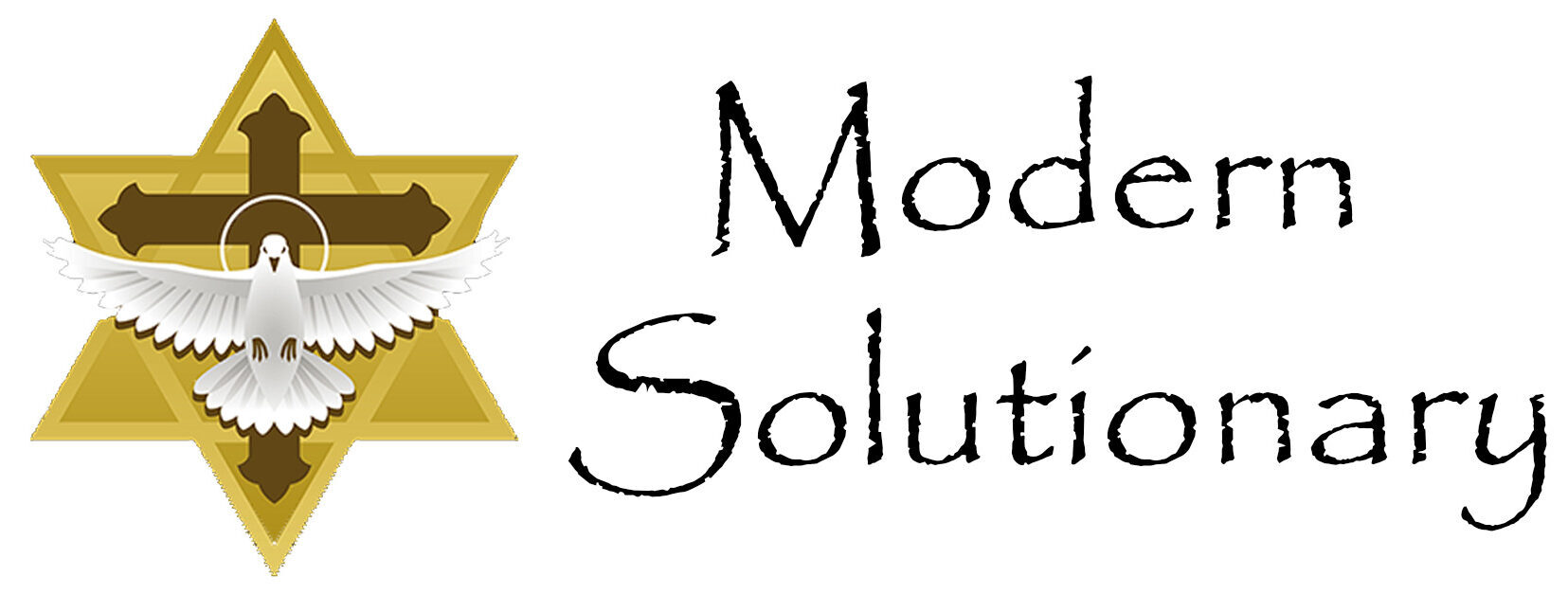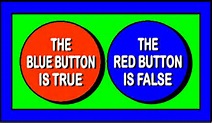 The great Greek philosophers solved the mysteries of thought centuries ago by writing the Three Laws of Thought. They determined and explained these undeniable truths so that future civilizations would not have to struggle to communicate with one another. The thoughts are universal and apply to every rational human on earth. Being laws of nature, they cannot be changed or edited by mankind. No matter how bad some people wish to do so, they have no power over the truth. There are many laws of nature; laws of physics, science, ecology and psychology just to name a few. They all form the basis of what we know as universal truths. It is the compilation of these truths that form the basis for wise reasoning. Without truth there can be no wisdom. Without wisdom we can never learn to solve our problems permanently.
The great Greek philosophers solved the mysteries of thought centuries ago by writing the Three Laws of Thought. They determined and explained these undeniable truths so that future civilizations would not have to struggle to communicate with one another. The thoughts are universal and apply to every rational human on earth. Being laws of nature, they cannot be changed or edited by mankind. No matter how bad some people wish to do so, they have no power over the truth. There are many laws of nature; laws of physics, science, ecology and psychology just to name a few. They all form the basis of what we know as universal truths. It is the compilation of these truths that form the basis for wise reasoning. Without truth there can be no wisdom. Without wisdom we can never learn to solve our problems permanently.
So what will we glean from these Laws of Thought?
- First, they are natural laws which man cannot control; regardless of their desire.
- The truth was as critically important then and it is today in finding solutions to problems.
- These three laws are the foundation of every country’s legal system.
- Mankind continues to be a selfish creature; wanting what it wants above the truth.
- The Wisdom of Three gives us the blueprints for solving all of our problems.
These are just a few lessons we can learn from these laws. In 970 BC, 500 years before these laws were written, the first Solutionary, King Solomon was already a master at them. The principles taught by Solomon are not unique to the Jews; they apply to all people in all times. We should find a way to return to teaching these laws to our children. Though the laws are eternal, their lessons and their application have obviously been lost to the passage of time.
Enjoy and please share this information with everyone you know.
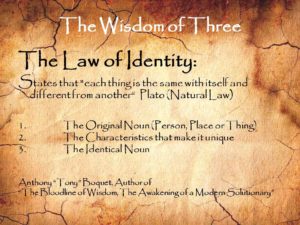
The Law of Identity
Dating back to ancient Greece, circa 369 BC compliments of the philosopher Plato, a student of Socrates and a teacher of Aristotle, the law of identity is the first of the three classical laws of thought. It states that “each thing is the same with itself and different from another”. Realizing that in order to communicate with clarity, people needed to distinguish one thing from another. Regardless what we talk or think about, things all have their own unique set of characteristic, qualities, and features, which the ancient Greeks called its “essence”. This essence was not focused on the superficial elements like color of skin, race, or gender. The philosophers of their time came to the sensible conclusion that things that have the same essence are indeed the same thing, while things that have different essences are different things. For instance, a bird is not a cat.
I know what you are thinking, duh.
Well, don’t be so fast to believe that everyone understands these laws of nature. Here we are about 2500 years later and our so called leaders are trying to convince us that one thing is another. It happens every day.
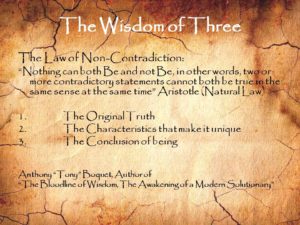
The Law of Non-Contradiction
In the words of Aristotle, “one cannot say of something “that it is and that it is not” in the same respect and at the same time”. As an example, he wrote:
“It is impossible, then, that “being a man” should mean precisely not being a man, if “man” not only signifies something about one subject but also has one significance … And it will not be possible to be and not to be the same thing, except in virtue of an ambiguity, just as if one whom we call “man”, and others were to call “not-man”; but the point in question is not this, whether the same thing can at the same time be and not be a man in name, but whether it can be in fact.”
— Aristotle, Metaphysics, Book IV, Part 4
Even in the BC era, people wanted to have it both ways, especially when it fit their personal agenda. They too wanted others to agree with their position when they argued for an issue that was false but instead, these inaugural thought-leaders stood up and spoke out against foolish thinking by clarifying the truth.
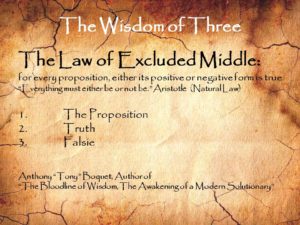
The Law of Excluded Middle
This is what Aristotle wrote of the law of excluded middle:
“But on the other hand there cannot be an intermediate between contradictories, but of one subject we must either affirm or deny any one predicate. This is clear, in the first place, if we define what the true and the false are. To say of what is that it is not, or of what is not that it is, is false, while to say of what is that it is, and of what is not that it is not, is true; so that he who says of anything that it is, or that it is not, will say either what is true or what is false.”
— Aristotle, Metaphysics, Book IV, Part 7
The Greeks clarified that in every case, every circumstance, and every condition there can only be what is true and what is false. There is no middle ground when settling contradictions. The answer will always be true or false; it cannot be true and false at the same time. The result of this simple law befuddles the minds of those wishing things to be as they imagine them to be.
Anthony “Tony” Boquet, the author of “The Bloodline of Wisdom, The Awakening of a Modern Solutionary”
If this is my last post, I want all to know there was only one purpose for all that I have written; to have made a positive difference in the lives of others.
